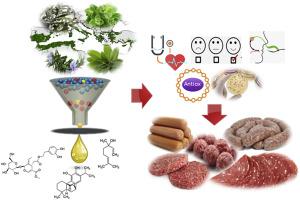Trends in Food Science & Technology ( IF 15.1 ) Pub Date : 2020-04-23 , DOI: 10.1016/j.tifs.2020.04.010 Kazem Alirezalu , Mirian Pateiro , Milad Yaghoubi , Abolfazl Alirezalu , Seyed Hadi Peighambardoust , Jose M. Lorenzo

|
Background
Antioxidants and antimicrobials are increasingly becoming important additives in meat industry to extent shelf life and increase acceptability. Oxidative changes and microbiological activities have negative effects on the sensory, stability, nutritional and acceptability properties of the meat products. Mediterranean plant extracts and essential oils (EOs) have been studied as potential natural antimicrobials and antioxidant activity added to meat and meat products, as well as medicinal and functional properties. In recent years, plant derivatives are fairly becoming important in minimal processed products because of the high phenolic content, what allows to enhance the color stability and decrease off-flavors.
Scope and approach
This review provides recent information of phytochemical components, advanced extraction technologies and phenolic composition of Mediterranean plant extracts and EOs, as well as their antioxidant, antimicrobial, health promotion and sensory properties as natural preservatives in meat and meat products.
Key findings and conclusions: A high concentration of phenolic and flavonoid content was observed in microwave assisted extraction (MAE), followed by ultrasound assisted extraction (UAE), conventional solvent extraction, and CO2 extraction. Phenolic acids and terpenoids were usually among the major components of common Mediterranean plant extracts and essential oils, respectively. Rosemary, garlic, lavender, leek, olive leaf, onion, oregano, pepper, peppermint, sage and Satureja montana are most important aromatic Mediterranean plant species used in meat industry and have exhibited similar or better antimicrobial and antioxidant properties than chemical preservatives. Flavonoids have beneficial effects on human and have been linked with the prevention of atherosclerosis, hypertension, dementia, diabetes and thrombosis.
中文翻译:

选定的用于肉类产品的地中海植物的植物化学成分,先进的提取技术和技术功能特性。全面审查
背景
抗氧化剂和抗微生物剂正日益成为肉类工业中重要的添加剂,以延长保质期并提高可接受性。氧化变化和微生物活动对肉类产品的感官,稳定性,营养和可接受性产生负面影响。已经对地中海植物提取物和精油(EOs)进行了研究,将其作为潜在的天然抗菌剂和抗氧化活性添加到肉和肉制品中,以及药用和功能特性。近年来,由于高酚含量,植物衍生物在最低限度加工的产品中已变得相当重要,这可以增强颜色稳定性并减少异味。
范围和方法
这篇综述提供了有关地中海植物提取物和EOs的植物化学成分,先进的提取技术和酚类组成的最新信息,以及它们在肉类和肉类产品中作为天然防腐剂的抗氧化剂,抗菌剂,促进健康和感官特性。
主要发现和结论:在微波辅助萃取(MAE),随后的超声辅助萃取(UAE),常规溶剂萃取和CO 2萃取中观察到高浓度的酚和类黄酮含量。酚酸和萜类化合物通常通常分别是常见的地中海植物提取物和精油的主要成分。迷迭香,大蒜,薰衣草,韭菜,橄榄叶,洋葱,牛至,胡椒,薄荷,鼠尾草和Satureja蒙大拿州是肉类工业中最重要的芳香性地中海植物品种,与化学防腐剂相比,具有相似或更好的抗菌和抗氧化特性。类黄酮对人体具有有益作用,并与预防动脉粥样硬化,高血压,痴呆,糖尿病和血栓形成有关。











































 京公网安备 11010802027423号
京公网安备 11010802027423号